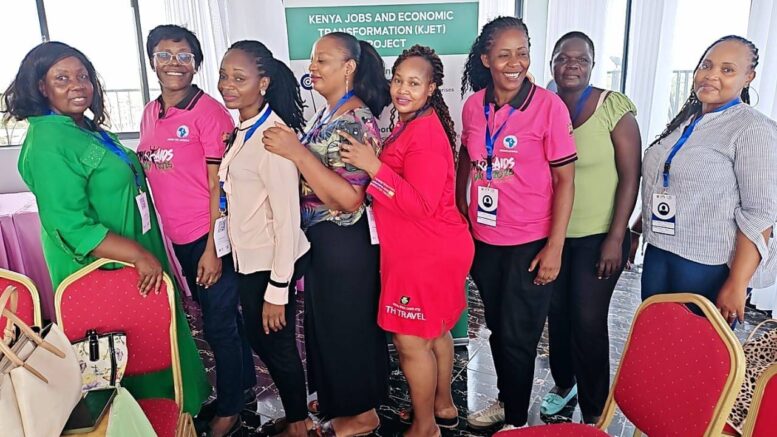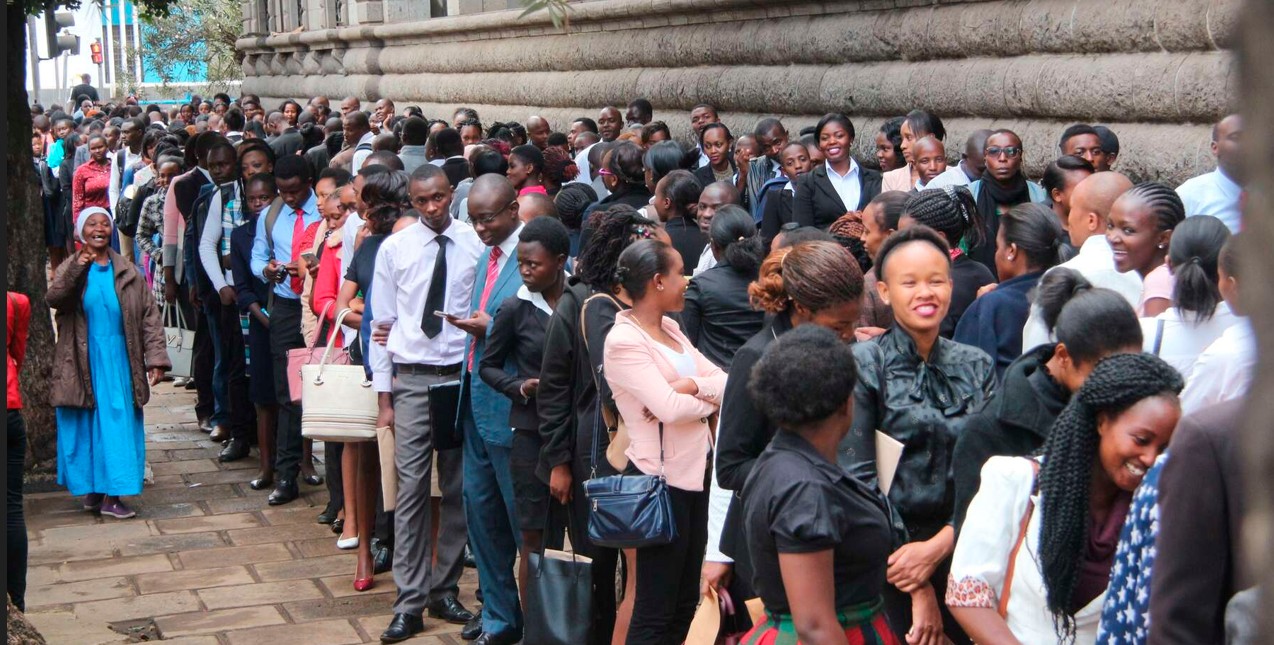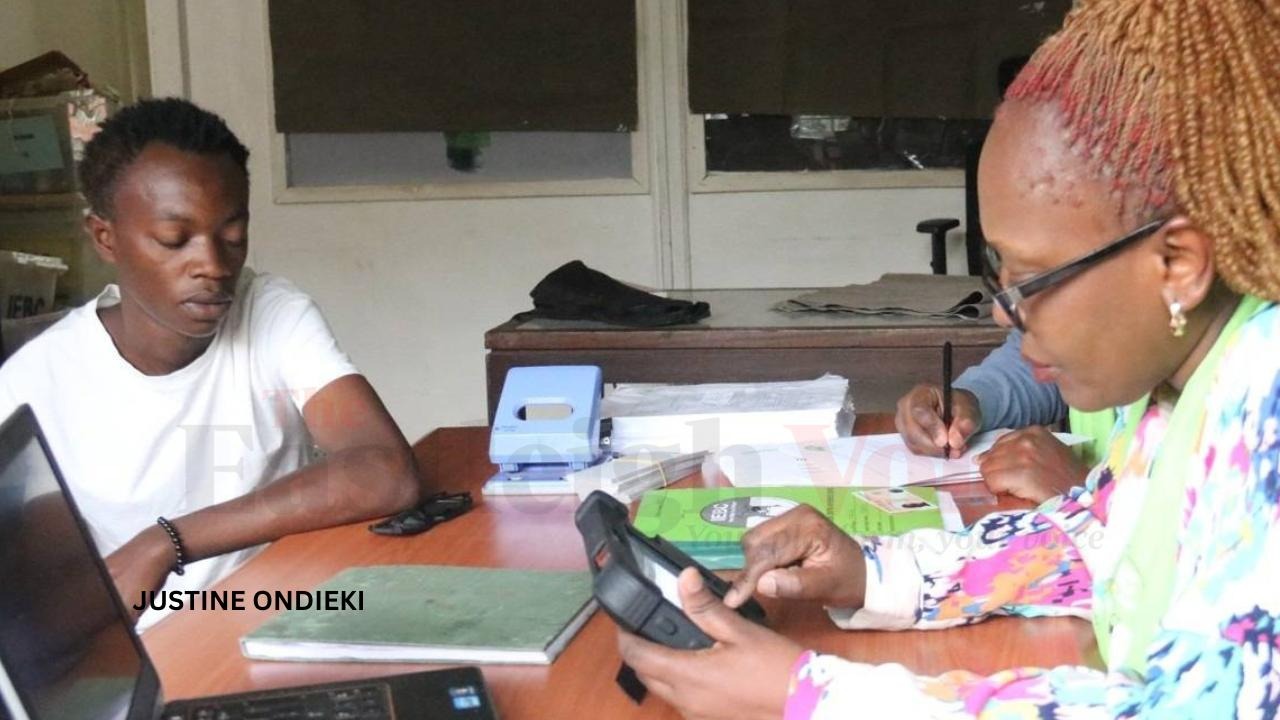How disquiet over villages cluster project ignited deadly Tana River clashes
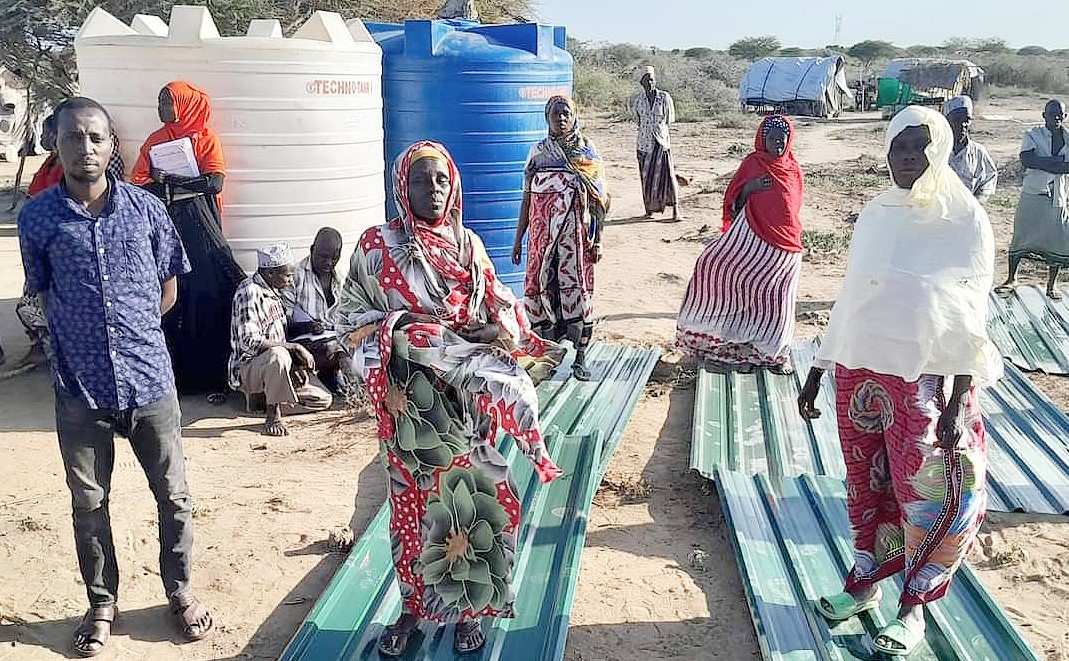
As relative calm returns to Tana River County, the future of the cluster project remains in limbo.
In the last two months, a ghost that was buried in the shallow grounds of Tana River County after the 2012 clashes was woken from slumber.
In less than six weeks, more than 20 men and women were killed, some shot in broad daylight by unknown assailants while others were slaughtered in retaliatory attacks.
More To Read
- 15 flood-displaced families in Tana River receive permanent homes in Garsen
- Tana River Senator seeks Senate health probe after pregnant woman dies from snakebite
- Mungatana decries misuse of firearms by police officers in Tana River
- Construction work at Tana River Bridge disrupts water supply in Garissa
- Tana River, Italian firm sign deal on conservation and tourism
- Celebrations as Wayu Daba community in Tana River receive title deed for communal land
Hundreds of families have since relocated to safe areas, men taking away their families and returning to guard their homes.
Schools closed down, and thousands of children failed to complete learning in the third term. Businesses were affected, as a dark cloud and a sombre mood engulfed Bura Constituency as two communities fought for land.
A cluster project, a noble idea seeking to establish modern villages to relocate flood survivors from wetlands, is blamed for being the kill-switch.
The county administration had mapped out 15 areas to be developed into eco-villages, a multi-billion-shilling pilot project.
"We have a design that incorporates all social amenities including water supply, schools, markets, health centres and even farms in these areas, it is going to be a village of its own kind," said Governor Dhadho Godhana in an earlier interview.
According to the governor, the county administration was losing nearly Sh2 billion each time there was a climate-related disaster, money that can be put to other good use.
Solution to perennial disaster
Godhana noted that the cluster project was a solution to the perennial disaster, as families would be allowed to keep their farms in the lowlands but reside in safe places.
"We are no longer going to make or develop any plans in areas that are flood-prone, rather we shall design all our plans in these eco-villages," he said.
The county administration, through the Department of Lands, in partnership with the Department of Public Works, went ahead to invest more than Sh400 million to create access roads and shallow wells in the Handampia cluster.
Uproar from herders
It was the Handampia cluster that created an uproar from the herder community, becoming the genesis of an aggressive contest.
"This thing is biased, it is designed to benefit one community and undermine the others, and that is why even the procedure to obtain the land has been skewed," claimed Mahmoud Argamso, an elder.
Public participation concerns
Argamso had raised several concerns with how the public participation for the cluster project had been done, warning leaders and security agencies of clashes if the county administration pushed on with the idea.
According to the elder, the county administration left out the herder community in the public participation process and only engaged the farming community. This they viewed as a plan to displace them from their ancestral land.
"We are not opposed to the idea; it will inspire urbanisation. We all want our economy to grow, but when such an idea is used as a weapon against the herder communities, it loses its meaning," he said in an interview.
Argamso, a whistle-blower to the chaos that were building up in Tana River, further gathered elders and approached the security agencies in the county with their concerns.
Filed petition
Noticing that there was no political goodwill and the security agencies were not acting promptly, he filed a petition at the county assembly against the physical development plan.
"I tried my best, I told security agencies that there was going to be chaos. I urged the county commissioner to call all the leaders and stop this plan until all communities were involved in the discussion, but it didn't work," he said.
While he kept pressing on, the county administration urged a group of people, said to be survivors of floods, to occupy a piece of land and await allocation and settlement.
More than 400 households occupied an area in Dayate village, with each being promised five acres of land.
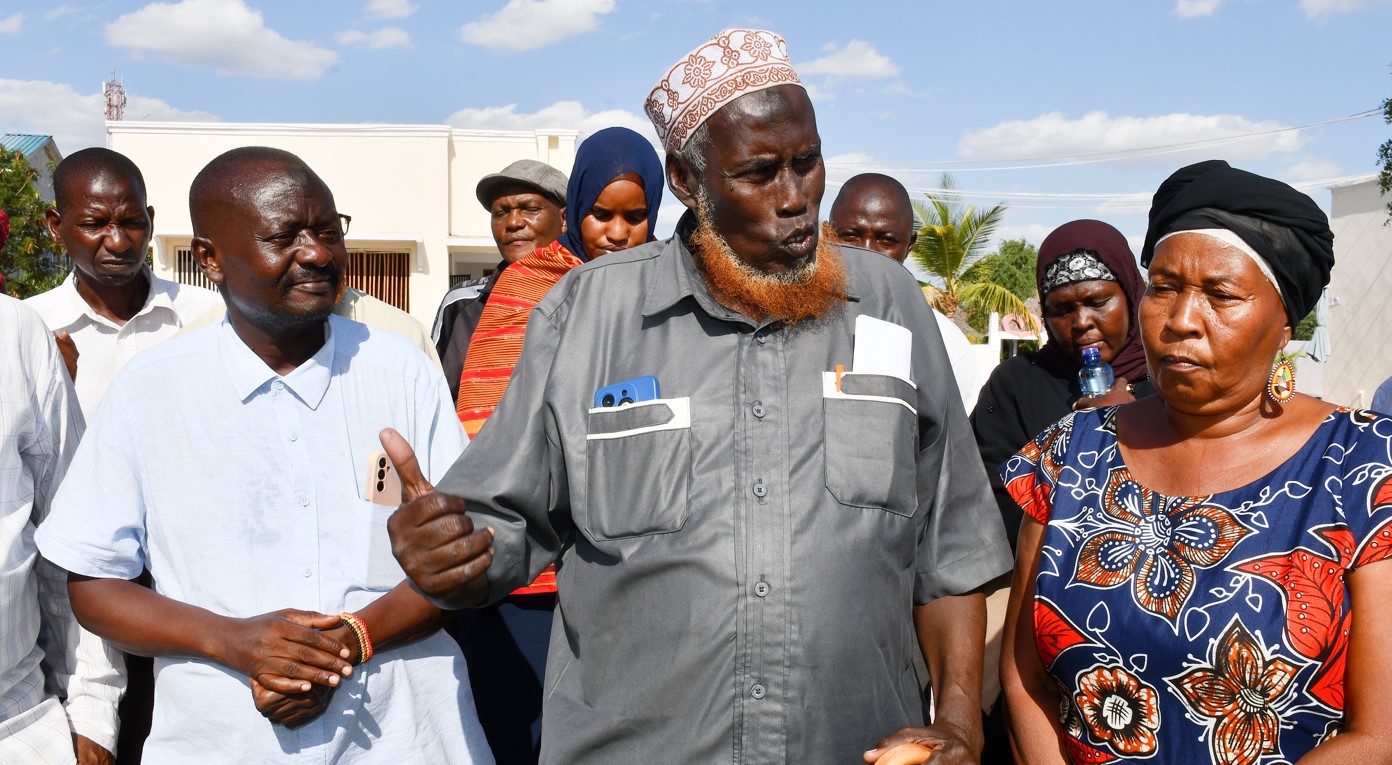 Mahmoud Argamso, an elder and activist, speaks to journalists in Hola, Tana River County. He is flanked by lobbyists. (Photo: Farhiya Hussein)
Mahmoud Argamso, an elder and activist, speaks to journalists in Hola, Tana River County. He is flanked by lobbyists. (Photo: Farhiya Hussein)
"We have been paying for land; the county administration promised us land but they didn't tell us the exact place they would settle us until recently when they asked us to come here,” said a retired government officer who sought anonymity.
According to the retired officer, the occupants of the land are members of a community-based organisation who had responded to directives from the leaders of their group allegedly acting on orders from a senior county leader.
The order from "above" had not only affected movement to occupy Dayate, but also the land near KBC station in Tana North Sub-County and other places along the Bura-Garissa highway that remain tense.
While elders in Dayate engaged authorities through a legal process, the community claiming the KBC land and a piece of land in Bura as their ancestral land sent threatening warnings to the occupants.
"We did receive warnings from them in writing and verbally. I travelled from Madogo to Hola to alert the security agencies about the threats several times but they didn't pay much attention,” said Mohammed Lalafa, a resident.
Lalafa said their neighbours had threatened them not to insist on occupying the land.
He noted that whereas they didn't intend to cause any chaos by forcefully occupying the land, the county administration assured them that the land did not belong to any community, urging them to move in and settle there.
"They brought us a tank for water to sustain the community members who had moved there and even promised them iron sheets and timber to build houses," he said.
One killed in attack
Two weeks after the guests occupied the land, an attack happened in which one person was killed, hence the tension.
The attacks kept spreading to other settlements and into villages, affecting learning and causing more grief.
"The security agencies were not doing anything amid the killings until three people were killed in Bura. The community had already lost seven people by then and had decided to stand up for themselves," said Lalafa.
Guns were drawn, machetes flew, arrows shot and spears thrown. In less than two months, more than 20 people were killed in the chaos.
What followed were retaliatory attacks.
"The security agencies are to blame for these retaliatory attacks. We warned about this long ago, we still don't know what took them so long to respond and even while at it, people have died," said James Rashid, a human rights activist.
Lobby groups have warned that chaos over land in the county will remain unresolved until some officers in the Department of Land are arrested.
Corrupt land officer
John Dhadho, the chairman Tana River Civil Society Network, claimed that the executive wing in the Department of Land is creating a foundation for more chaos.
"We have cases that have been brought to us where a member of the executive in the Department of Land has sold the same piece of land to two or three people and each one of them has an allotment letter signed by the officer; they have each lost Sh200,000," he said.
He urged the security agencies to arrest the officers from the department who are also suspect in land grabbing through proxies, and giving fake documents to unsuspecting land buyers.
This, he said, will cause worse chaos in future if not resolved right away as the victims are only trying to exhaust all legal channels before they can take action for their loss.
"We have a man who has been walking around with a machete looking for a senior lands officer; he brought us his complaint. We are aware that even the said officer does not operate from his office now because there are many people looking for him," he claimed.
At the Hola court, cases against the said officer are piling, with each petitioner accusing him of fraud in land dealings gone wrong.
As relative calm returns to Tana River County, the future of the cluster project remains in limbo.
National and county government officials continue to deliberate with other leaders on how to approach the project.
"We have managed to hold several meetings with the leaders and we are making progress on this matter, there is no course for worry," said Tana River County Commissioner David Koskei.
Koskei noted that security agencies have also stamped their authority in areas affected by the chaos, warning leaders to desist from making inflammatory statements in relation to the conflict.
In his speech during the Mashujaa Day celebrations, Koskei noted that leaders were careless in their utterances hence gaslighting the chaos.
"I have men on the ground, if you will not tame your tongue as a leader, don't call me when you are picked at midnight, I will not respond to your plea," he warned.
Even as discussions pick pace, sources reveal that most of the leaders from the herder communities insist on the plan being dropped while those from the farmer communities suggest it should continue, leaving out areas that have attracted conflict.
With hundreds of millions of shillings already spent on the project, dropping the idea will mean loss of funding for projects from partners including the World Bank, Kenya Informal Settlement Implementation Programme, Habitat for Humanity, among others, sinking a Sh100 billion opportunity.
Efforts to reach the County Executive for Land Mwanajuma Hiribae to comment on the progress of the talks did not yield fruit as messages sent on WhatsApp went unanswered despite being received.
However, Tana River Deputy Governor in his Mashujaa Day Speech noted that the cluster project is not the cause for the conflict and should not be blamed.
"The cluster project cuts across the county. Why have there been no attacks in Tana Delta? Why only in Tana North? This is not about the cluster project," he said.
He hinted that the administration will continue with the project as it has the backing of the president in line with urbanising villages.
Meanwhile, several people affected by the cluster project continue to forward complaints to relevant agencies to avert conflicts.
Top Stories Today


